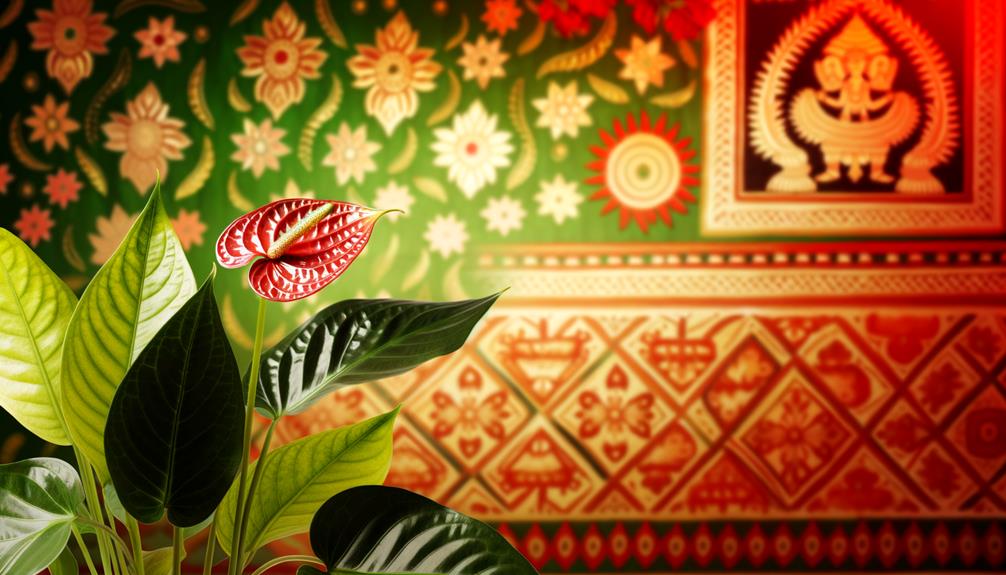Understanding the Anthurium Meaning in Bengali Culture
In Bengali culture, Anthuriums hold deep symbolic meanings, representing prosperity, purity, and enduring affection. Introduced during colonial times, they were embraced for their vibrant appearance and adaptability.
These flowers are integral to ceremonies like weddings, symbolizing purity and prosperity, and are often used in religious offerings to elevate spiritual ambiance. Their bold colors and heart-shaped leaves signify hospitality and warmth, making them popular in welcoming guests.
Anthuriums also represent intense love and passion, reflecting commitment and desire. Through their multifaceted symbolism, Anthuriums enrich Bengali traditions and values.
Understanding these nuances reveals a deeper appreciation for their cultural significance.

Key Takeaways
- Anthuriums symbolize hospitality, prosperity, and abundance in Bengali culture.
- They are used in ceremonies and festivals to represent purity and divine blessings.
- Anthuriums signify intense love, passion, and commitment between partners.
- The flowers are believed to attract good fortune and positive energy.
- In religious practices, Anthuriums symbolize devotion, purity, and spiritual elevation.
Historical Background
In tracing the historical background of Anthurium in Bengali culture, you'll find that its introduction can be linked to the colonial botanical exchanges of the 19th century. During this period, British colonists and botanists brought various exotic plants to India, including the Anthurium.
These botanical exchanges were part of broader efforts to catalog and cultivate diverse flora. As the plant was introduced to Bengal, it quickly gained popularity due to its striking appearance and adaptability to the local climate.
The Anthurium's vibrant colors and unique structure made it a favorite among the Bengali elite, who incorporated it into their gardens and homes. This introduction period laid the foundation for the Anthurium's eventual cultural significance in Bengal.
Symbolism in Bengali Culture
When you explore the symbolism of the anthurium in Bengali culture, you'll find it rich with traditional interpretations that reflect its beauty and crucial.
These flowers are often used in ceremonies, symbolizing purity and prosperity, and they carry a deeper spiritual and emotional resonance among the people.
Understanding these layers of meaning helps you appreciate how anthuriums are woven into the cultural and ritualistic fabric of Bengal.
Traditional Symbolic Interpretations
Rooted deeply in Bengali culture, the anthurium flower is often seen as a symbol of hospitality, prosperity, and abundance. When you explore its traditional symbolic interpretations, you'll notice that it reflects the values cherished in Bengali households. Anthuriums are frequently placed at entryways, welcoming guests with warmth and generosity.
Their vibrant colors and heart-shaped leaves signify not just a rich aesthetic but also the prosperity of the home they adorn. Additionally, the flower's enduring nature is interpreted as a sign of lasting abundance and well-being. By incorporating anthuriums into your home, you're embracing a tradition that values both material and spiritual richness, reflecting the deep cultural emphasis on nurturing and sustaining relationships.
Ceremonial Significance Explained
As you explore the ceremonial significance of anthuriums in Bengali culture, you'll discover that these flowers hold a pivotal role in various rituals and celebrations, symbolizing purity, respect, and divine blessings. They're often incorporated into traditional ceremonies, enhancing the spiritual ambiance and reflecting cultural values.
To grasp their deeper meaning, consider the following:
- Weddings: Anthuriums are commonly used in matrimonial decorations, symbolizing the purity of the marital bond.
- Religious Rituals: These flowers are offered in temples and during religious ceremonies, embodying respect and devotion to deities.
- Festivals: During festivals, anthuriums adorn homes and public spaces, invoking divine blessings and ensuring auspiciousness.
Understanding these uses highlights how anthuriums seamlessly integrate into the cultural fabric, enriching Bengali ceremonial practices.
Spiritual and Emotional Resonance
Anthuriums, with their vibrant hues and unique heart-shaped bracts, embody a profound spiritual and emotional resonance in Bengali culture, symbolizing deep-seated emotions like love, devotion, and spiritual purity.
You'll find these flowers often used in rituals, where their intense colors and shapes are believed to channel positive energies. They're not just visually striking but also carry a symbolic weight that's deeply rooted in regional beliefs.
When you see anthuriums in Bengali homes or temples, they're not mere decorations; they stand as embodiments of heartfelt sentiments and spiritual aspirations. This makes them particularly special, as they're intertwined with cultural expressions of affection and piety, creating a bridge between the tangible and the metaphysical.
Love and Passion
Expressing deep emotions, anthuriums in Bengali culture often symbolize the intense love and passion shared between partners. This vibrant flower, with its striking red spathe and heart-shaped form, is a powerful emblem of romantic connection.
You can see how its rich symbolism breaks down into three key aspects:
- Commitment: The enduring nature of the anthurium mirrors the steadfast bond between lovers.
- Desire: Its bold color and exotic appearance evoke a sense of longing and deep attraction.
- Affection: The heart-like shape directly represents the heartfelt emotions partners feel for each other.
When you gift an anthurium, you're not just giving a flower; you're conveying profound sentiments of love and passion, deeply rooted in Bengali tradition.
Hospitality and Warmth
In Bengali culture, using anthuriums as part of floral arrangements is a traditional gesture that signifies hospitality and warmth.
You'll find that these flowers are often used to welcome guests, symbolizing the host's genuine desire to make visitors feel at home.
Understanding this practice sheds light on the cultural importance placed on creating a warm and inviting atmosphere.
Traditional Welcoming Gesture
Welcoming guests with anthuriums in Bengali culture symbolizes the deep-rooted values of hospitality and warmth, reflecting a tradition where every visitor is treated with utmost respect and kindness. When you receive an anthurium upon arrival, it's not just a flower; it's an emblem of the host's genuine care.
Here's why this gesture is significant:
- Respect: Offering anthuriums shows reverence for the guest, acknowledging their importance.
- Warmth: The vibrant, heart-shaped flowers convey a heartfelt welcome, making guests feel cherished.
- Tradition: This act connects present-day hospitality to ancient customs, preserving cultural continuity.
Through such gestures, you experience the essence of Bengali hospitality, where every detail is thoughtfully considered to make you feel at home.
Symbolic Floral Arrangements
Symbolic floral arrangements featuring anthuriums in Bengali culture not only enhance the aesthetic appeal of a setting but also serve as a tangible manifestation of the host's commitment to hospitality and warmth. You're likely to see these striking flowers at various social gatherings, where their vibrant colors and unique shapes create an inviting atmosphere. Anthuriums are meticulously arranged to convey respect, care, and a genuine welcome to guests. Here's a breakdown of their symbolic attributes:
| Attribute | Description | Significance |
|---|---|---|
| Color | Red, pink, white | Passion, warmth, purity |
| Shape | Heart-like spathe | Love and friendship |
| Arrangement | Central piece in bouquets | Focal point of welcome |
| Texture | Glossy, smooth petals | Elegance and grace |
Cultural Significance Explained
As you explore the cultural significance of anthuriums in Bengali traditions, you'll find that these flowers are more than mere decorative elements; they embody the essence of hospitality and warmth intrinsic to the community.
Anthuriums are often used in welcoming guests, symbolizing open-heartedness and genuine care. They also adorn religious ceremonies, enhancing the spiritual atmosphere with their serene beauty.
Consider the deeper meanings:
- Welcoming Gesture: Placing anthuriums at the entrance signifies inviting warmth.
- Spiritual Harmony: Their presence in rituals symbolizes peace and divine connection.
- Aesthetic Appeal: Their unique shape and vibrant colors evoke joy and positivity.
Understanding these facets reveals how anthuriums resonate with Bengali values and enhance communal experiences.
Good Fortune
In Bengali culture, the vibrant anthurium flower is often seen as a harbinger of good fortune, symbolizing prosperity and success in various aspects of life.
You might notice these flowers prominently displayed during significant events like weddings and housewarming ceremonies. Their bold colors and unique shapes are believed to attract positive energy and ward off negativity.
This association with good fortune isn't merely decorative; it's deeply rooted in the cultural psyche. Families often gift anthuriums to convey wishes for wealth, happiness, and overall well-being.
It's not just about the flower's aesthetic appeal; it's about the hope and positivity it brings. By incorporating anthuriums into daily life, you're participating in a tradition that celebrates abundance and auspicious beginnings.
Religious Significance
You'll find that anthuriums hold a special place in Bengali religious practices, where their vibrant blooms symbolize purity and devotion.
They're often used in rituals, not just as offerings to deities but also as decorations that enhance the spiritual ambiance.
This dual role underscores their significance, blending aesthetics with deep cultural meanings.
Symbolism in Rituals
Anthuriums, with their vibrant, heart-shaped blooms, hold a sacred place in Bengali religious rituals, symbolizing divine beauty and spiritual connection. You'll find these flowers prominently displayed during important ceremonies, reflecting their deep-rooted spiritual significance. They serve not only as decorative elements but also as powerful symbols of purity and devotion.
Consider the following key aspects:
- Symbol of Divine Love: Anthuriums represent the divine love between deities and devotees, fostering a deeper spiritual bond.
- Purity and Prosperity: Their pristine appearance is believed to invite purity and prosperity, essential elements in religious practices.
- Spiritual Elevation: Offering anthuriums is seen as a gesture that elevates one's spiritual status, aligning the devotee closer to the divine.
Understanding these aspects can deepen your appreciation of their role in rituals.
Offerings and Decorations
When preparing for religious ceremonies, incorporating anthuriums as offerings and decorations emphasizes their profound spiritual significance and enhances the sanctity of the occasion.
You'll find that anthuriums, with their striking red hues and heart-shaped spathes, symbolize devotion and purity. These attributes make them ideal for adorning altars and deities.
By placing anthuriums around sacred spaces, you're not only beautifying the environment but also invoking divine blessings. Their vibrant color contrasts beautifully with traditional white and gold religious attire, creating a visually uplifting atmosphere.
Additionally, the anthurium's enduring nature guarantees that your offerings remain fresh throughout extended ceremonies, reinforcing the continuity of worship and reverence in Bengali culture.
Use in Festivals
In Bengali culture, Anthuriums are meticulously arranged in vibrant floral displays that play a central role in various festivals, symbolizing both prosperity and aesthetic elegance. These flowers aren't just decorative elements; they carry deep cultural significance. During Durga Puja, Anthuriums adorn altars, enhancing the spiritual ambiance. Similarly, in Saraswati Puja, they're used to symbolize knowledge and purity.
To understand their importance:
- Prosperity: Anthuriums represent wealth and success, essential themes in festival celebrations.
- Aesthetic Beauty: Their vibrant colors and unique shapes enhance visual appeal.
- Cultural Symbolism: They embody spiritual and cultural values intrinsic to Bengali traditions.
Role in Weddings
How do Anthuriums play a pivotal role in Bengali weddings, intertwining with both tradition and modernity? You'll find these vibrant flowers in various wedding elements, symbolizing love and prosperity. First, they're woven into bridal bouquets, adding a touch of elegance and symbolism.
| Wedding Element | Role of Anthuriums |
|---|---|
| Bridal Bouquets | Elegance and symbolism |
| Venue Decorations | Aesthetic and tradition |
| Ritual Accessories | Symbolic significance |
Next, they're used extensively in venue decorations, merging aesthetic appeal with traditional values. Afterward, you'll see Anthuriums in ritual accessories, where they hold deep symbolic significance, often related to auspiciousness and prosperity. These flowers seamlessly bridge the gap between age-old customs and contemporary wedding trends.
Modern Interpretations
Today's Bengali culture embraces Anthuriums not just for their traditional symbolism but also for their contemporary appeal in modern settings.
You'll notice these vibrant flowers in various aspects of daily life, reflecting a blend of heritage and modernity. Here's how:
- Home Décor: Anthuriums add a touch of elegance and sophistication to living spaces, symbolizing prosperity.
- Corporate Spaces: In offices, they represent growth and productivity, fostering a positive work environment.
- Gifting: These flowers are popular gifts, symbolizing good luck and heartfelt wishes in a modern context.
Gardening and Care
Cultivating Anthuriums requires understanding their specific needs for light, water, and soil to ensure they thrive in your garden or home. These tropical plants prefer indirect, bright light and can suffer from direct sun exposure, which may scorch their leaves.
Water them regularly, ensuring the soil remains moist but not waterlogged; overwatering can lead to root rot. Anthuriums thrive in well-draining, organic-rich soil, ideally a mix of peat, pine bark, and perlite.
Additionally, maintaining a warm temperature between 60-85°F and high humidity levels is essential for their growth. Mist the leaves occasionally or use a humidity tray. Fertilize monthly with a balanced, water-soluble fertilizer to support their vibrant blooms and lush foliage.
Global Influence
While mastering the care of Anthuriums is essential for their growth, it's equally fascinating to explore how these striking plants have impacted cultures around the globe.
In European countries, Anthuriums symbolize hospitality and are often given as housewarming gifts. In Hawaiian culture, they represent love and are used in leis and decorations for weddings.
To help you understand the global influence of Anthuriums, consider these points:
- Symbolism: Anthuriums are seen as symbols of hospitality, love, and abundance in various cultures.
- Decorative Use: Their vibrant colors and unique shapes make them popular in floral arrangements and interior decor.
- Economic Impact: Globally, Anthuriums contribute significantly to the ornamental plant market, boosting local economies.
Conclusion
In Bengali culture, the Anthurium is like an ancient storyteller, weaving tales of love, warmth, and fortune. Just as its vibrant petals invite you in, these flowers symbolize the open arms of hospitality and the fervent hearts of passion.
Whether adorning wedding ceremonies or gracing modern homes, Anthuriums are more than just blooms—they're a living narrative of tradition and modernity, intertwining the old with the new in an ever-evolving cultural tapestry.






